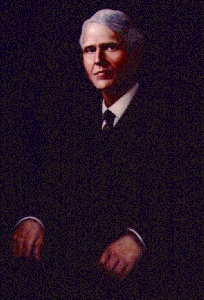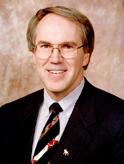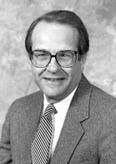 "I hope the few who read these pages will be baptized in the old faith that in social
cooperation lies the possibility of self-realization.."
"I hope the few who read these pages will be baptized in the old faith that in social
cooperation lies the possibility of self-realization.."
-- Woodbridge N. Ferris
Woodbridge N. Ferris, a native of New York, became a remarkable individual of Michigan. His influence continues to effect the lives of thousands through the practical school he founded in 1884 in Big Rapids, Michigan which has grown to be Ferris State University. As a two term progressive Governor of Michigan 1913-1917 he championed the conservation of natural resources, signed into law the Michigan Historical Commission, faced the perplexing labor-management challenge of the 1914 Copper Strike and in 1914-1915 contributed wisely to the peaceful settlement of the Ohio-Michigan boundary disputes. These actions and others earned him the title "Good Gray Governor."
In 1922 he was elected to the United States Senate where he observed the "Roaring 20's." Shortly before his death in 1928 he penned a visionary undelivered speech to the Senate in which he analyzed and called for the creation of a separate Cabinet level, Department of Education, fifty-one years before it was accomplished.
Perhaps the qualities of character which his son Carleton summarized in his Preface and Mr. Ferris reveals in his humble Autobiography will now help others advance his mission to "Make the World Better."
"I confess that there is no very reason for writing this book. Thousands of American men and women have made invaluable contributions to the progress of mankind without feeling called upon to 'tell the tale.' This is not an autobiography. It is a small sheaf of memories, prepared first for the edification of the immediate members of my own family. Second, for those among my thousands of students who feel that I may have been to them a real source of inspiration. The majority of Ferris students who have achieved success have traveled essentially the same road I have traveled."
-- Woodbridge N. Ferris
Certain it is that anyone who reads his autobiography cannot avoid the conviction that my father possessed one characteristic that is revealed consistently throughout his entire recital modesty. This trait of character undoubtedly explains the fact that his own compilation is essentially a bare recital of facts, unembellished with few exceptions with incidents in his life of a 'human interest' character."
-- Carleton G. Ferris
Co-Editors:
The W.N. Ferris Autobiography
Special Project Team
Theron Josephson, Assistant Professor of Geography
Lawrence Martin, Coordinator of Archives
Susan Martin, Typesetter Technician, Graphic Arts
Richard A. Santer, Team Leader, Professor of Geography
Jerry Sholl, Photographer, Media Production
Esther Simpson, Assistant to the President, Board of Trustees
Robert Stechschulte, Acting Associate Dean, College of Technology
William Taylor, Media Relations, University Advancement
Web Preparation: Dave Wininger, Coordinator Media Distribution
"Mr. President, it is taken for granted by everybody that education must occupy a prominent place in the affairs of a democracy. Notwithstanding this fact, I am not at all sure that the American people and even some of its lawmakers, fully realize the absolute necessity of universal education in a democracy."
Woodbridge N. Ferris
Undelivered Address, U.S. Senate, 1928


William A. Sederburg, Ph.D. Richard A. Santer, Ph.D.
16th President, FSU Project Team Leader
The Autobiography of W.N. Ferris
A Vision Fulfilled
In 1923 W.N. Ferris sensed that his autobiography may give inspiration to others. He died before he completed it. Later in the Depression years, Legislators proposed funding a biography on him. That effort also fell short. By 1948 Carleton Ferris no longer was able to carry the vision forward and donated a typescript autobiography of his father's to Ferris Institute hoping that ". . . later something could be done . . ." In the 1953 and 1984 centennial years publications were again proposed. Finally, it is with anticipation that this compilation will fulfill Mr. Ferris' original vision.
-- William A. Sederburg, 1995

